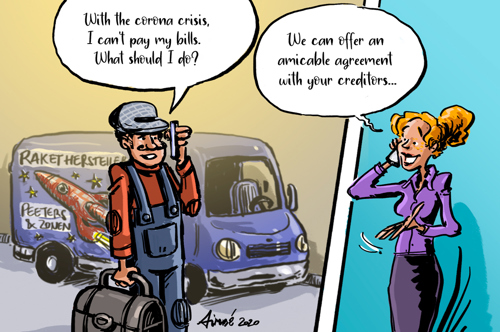- Insolvency Law
- Leo Peeters - Ann Vranken
- corona , corona crisis , suspension , bankruptcy , attachment , means of enforcement , reorganisation , forced transfer under judicial dissolution , judicial supervision
On 24 April 2020, Royal Decree No 15 has been published which temporarily protects companies against conservatory and enforcement attachment and bankruptcy (and judicial dissolution) and the dissolution of agreements due to non-payment.
This does not affect the obligation to pay due debts.
This temporary suspension of legal actions that may lead to insolvency applies from 24 April 2020 to 17 June 2020 for all enterprises whose continuity is threatened by the corona crisis, provided that they were not already in default on 18 March 2020.
What do these suspension measures entail?
1. Protection against attachment and means of enforcement
No conservatory or executive attachment may be levied and no means of execution can be used or continued on goods of the enterprise, for all the debts of the enterprise.
This provision does not apply to immovable property and to the conservatory attachment of seagoing and inland vessels.
2. Protection from forced bankruptcy, forced transfer under judicial dissolution and under judicial supervision
During the suspension, enterprises cannot be declared bankrupt on summons or, if they are a legal entity, dissolved by the courts.
Nor can a transfer under judicial supervision be ordered of all or part of its activities.
However, a bankruptcy or judicial dissolution remains possible if these take place at the initiative of the Public Prosecutor or a provisional administrator appointed by the president of the Enterprise Court.
Bankruptcy or judicial dissolution remains possible if the summoned enterprise itself agrees to it.
3. Protection within the framework of a reorganisation plan
Payment terms included in a reorganisation plan approved by a court before or after the entry into force of this Royal Decree will be extended by the duration equal to the suspension granted.
This may lead to an extension of the maximum term of five years for the implementation of the reorganisation plan and of the maximum suspension period in that context.

4. Protection of existing agreements
Agreements concluded prior to entry into force of the Royal Decree cannot be dissolved unilaterally or judicially due to the non-payment of a monetary debt payable under that agreement.
This provision does not apply to employment contracts.
5. Obligation to pay due and payable debts does not lapse
This provision does not affect the obligation to pay due debts. Also the common contractual penalties such as, inter alia, the exception of non-performance, off-setting of debts and the retention right remain unaffected.
It is without prejudice to the application of the Financial Security Law of 15 December 2004.
Nor does it affect employers' obligations.
6. The President of the Enterprise Court may may grant exceptions
Any interested party may ask the President of the Enterprise Court to examine whether a company falls within the scope of this Royal Decree and, if necessary, to lift this suspension in whole or in part.
This possibility is provided for in order to avoid abuses. The procedure can be initiated by means of a writ of summons and will be dealt with as in summary proceedings and on a priority basis over all other cases.
In his decision, the President of the Enterprise Court shall take into account the circumstances of the crisis and the extent to which they have affected the enterprise concerned.
In particular, he will examine whether the enterprise's turnover or activity has decreased significantly as a result of the corona crisis, whether economic unemployment was fully or partially applied for and whether the government has ordered the closure of the enterprise. In doing so, the President will take into account the applicant's interests.
7. Suspension of the obligation to file for bankruptcy
If the bankruptcy conditions are met due to the corona crisis, the debtor will be subject to a suspension to file for bankruptcy, during the suspension period granted by this Royal Decree.
This does not affect the debtor's ability to file for bankruptcy.
8. Protection of new credits
New credits - including suppliers' credits - granted to protected companies during the suspension period are protected against subsequent bankruptcy. The same applies to the securities provided for these credits or other acts established in execution thereof.
In addition, the lenders of these new credits cannot be held liable solely because the new credits have not effectively enabled the continuity of all or part of the debtor's assets or activities.
We refer also to our article "Corona crisis and insolvency".
If you are confronted with financial difficulties or if you are a creditor, please call us (+32 (0)2 747 40 07) or send an e-mail at coronataskforce@seeds.law.



